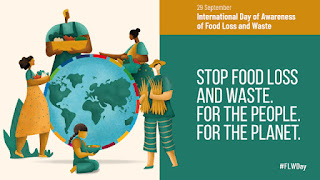Stop Food Waste!
“Considerable quantities of food are loss and wasted across the supply chain and at the consumer level. We can do better.”- Rosa Rolle, FAO, Senior Enterprise Development Officer.
We are all guilty. No one can dispute that we waste an enormous amount of food on a daily basis. Global food loss is valued at US$400 billion dollars yearly. The United Nations General Assembly designated 29 September as the International Day of Awareness of Food Loss and Waste (IDAFLW). The theme this year is ‘Stop Food Waste! For People and ! Planet’. The day is co-convened by the Food and Agriculture Organization of the United Nations (FAO) and the United Nations Environment Programme (UNEP). Sadly, all across the world food banks and pantries are running low on food. Reducing food losses and waste is critical in a world where millions of people go to bed hungry nightly. This is unacceptable and is cause for concern. The Food and Agriculture Organization of the United Nations states approximately 14 percent of the world's food is lost after harvest, up to but not including the retail stage of the supply chain, and an estimated 17 per cent is wasted in retail and at the consumption level. This food loss and waste account for 8 -10 per cent of the total global greenhouse gases (GHGs) contributing to an unstable climate and extreme weather events such as droughts and flooding. These changes negatively impact crop yields, reduce the nutritional quality of crops, cause supply chain disruptions and threaten food security and nutrition. The 2030 Agenda for Sustainable Development, specifically SDG 12, target 12.3 calls for halving per- capita global food waste at the retail and consumer levels and reducing food losses along production and supply chains. Disturbingly, an estimated 3.1 billion people worldwide do not have access to a healthy diet and some 828 million people go hungry. Undoubtedly, there is an urgent need to accelerate action to reduce food loss and waste.
With eight years left to reach the 2030 target, the urgency for scaling up action to reduce food loss and waste cannot be overemphasized.
The United Nations declares that food loss and waste undermine the sustainability of our food systems. When food is lost or wasted, all the resources that were used to produce this food - including water, land, energy, labour and capital - go to waste. In addition, the disposal of food loss and waste in landfills, leads to greenhouse gas emissions, contributing to climate change. Food loss and waste can also negatively impact food security and food availability, and contribute to increasing the cost of food.
Our food systems cannot be resilient if they are not sustainable, hence the need to focus on the adoption of integrated approaches designed to reduce food loss and waste. Actions are required globally and locally to maximise the use of the food we produce. The introduction of technologies, innovative solutions (including e-commerce platforms for marketing, retractable mobile food processing systems), new ways of working and good practices to manage food quality and reduce food loss and waste are important to implementing this transformative change. The IDAFLW’s call to action addresses both public and private entities, from across the food system, as well as consumers to work together to cut food loss and waste (FLW) to mitigate climate change, and support food security and nutrition. Reducing food loss and waste presents an opportunity for immediate climate benefits while improving the overall sustainability of our food systems a necessary transformation to ensure better planetary and nutritional outcomes for current and future generations. There is a tendency for us not to look at the environment concerning food loss. For example, when food is thrown away in landfills, it rots and releases even more greenhouse gasses into the environment. Keeping food waste out of landfills is one way to help the environment.
Reducing Food Loss
As consumers we all have a part to play in reducing food loss. The need to be mindful of the amount of food we require as against what we prepare cannot be underscored. Too many of us tend to cook more than we can eat or stored properly all which leads to waste. The time to revisit this cultural outlook regarding food requires an interrogation and a change of mindset. This change of consumer behaviour will not be easy; however, it is achievable and must be done in order to reduce food loss and waste. Last but by no means least, good governance, human capital development, collaboration and partnerships are essential in maximizing the positive impacts of reducing food loss and waste. Together we can work towards enhancing the efficient use of natural resources, mitigating climate change, and supporting food security and nutrition.
In the words of Tristram Stuart, cutting food waste is a delicious way of saving money, helping to feed the world and protect the planet.
Wayne Campbell is an educator and social commentator with an interest in development policies as they affect culture and or gender issues.
waykam@yahoo.com
@WayneCamo
©
#IDAFLW #InternationalDayOfAwarenessOfFoodLossAndWaste #foodsecurity #foodloss




Comments
Post a Comment